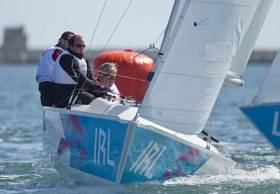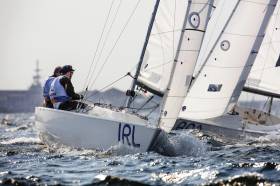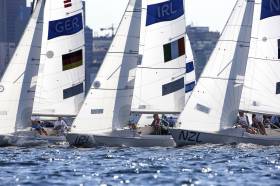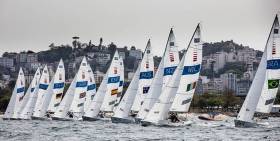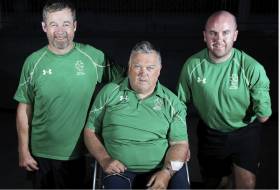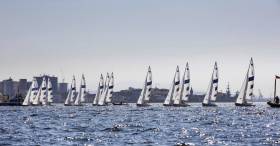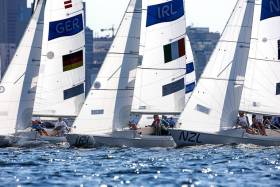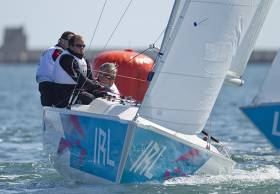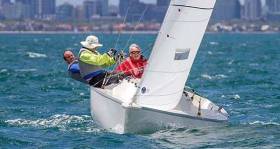Displaying items by tag: John Twomey
Irish Sailing Association Elects New President as AGM Hears of “Real Crisis in Irish Elite Sailing”
Irish Paralympic veteran John Twomey succeeded David O’Brien as Irish Sailing Association president at its AGM in Dublin on March 26.
The Kinsale-based sailor represented Ireland at 11 Paralympic games, in both sailing and athletics (competing in the discus event, in which he won a gold medal in Seoul in 1988).
The AGM also heard former ISA president Roger Bannon press the board for further details on its plans to address issues highlighted in the recent external review of the Tokyo Games performance.
“Over the last 17 years, probably something in the order of €15m has been spent on High-Performance activities, almost €1.5m last year alone, and we have one silver medal in 2016 to show for it, won in exceptional circumstance by a uniquely talented competitor who was provided with a lot of support from resources outside of the ISA,” Bannon told the meeting.
“After 17 long years, it is not an acceptable nor a sensible reaction to a real crisis in our elite sailing structures for the ISA to describe the high-performance area as an ongoing work in progress and noting that lessons have been learnt and then change nothing fundamental.”
Mr Bannon went on to caution that “Olympic and High-Performance activities absorb over 50% of the resources of the Association and perform a highly visible role on behalf of us all. If the government loses faith with our sport’s potential to win medals, the generous funding we have all been fairly easily obtaining in recent years at club and national level will quickly diminish and indeed I understand this has already started.”
Noting that he had consulted widely, both from current and former High Performance athletes and experienced international coaches, Mr Bannon described the High Performance as “not fit for purpose”, and asked the board to describe “what meaningful action the ISA is going to take to materially change things.”
The outgoing ISA president, Mr O’Brien previously told Afloat that “The Irish Sailing Board and OSG will continue to work closely to ensure the issues highlighted in the [Tokyo] report will be addressed, and the best possible results achieved in Paris.”
The new ISA President, Mr Twomey, helmed in the Mixed Three-Person Sonar, a 23-foot two-sail keelboat in the 2000 Sydney Games, 2004 Athens Games, 2012 London Games and 2016 Rio Games and the Mixed Two-Person SKUD18 in the 2008 Beijing Games. He was elected President of the International Association for Disabled Sailing in 2012.
Two serving directors of the ISA, Fiona Bolger and Nikki Curran, stepped down at the AGM, having served for five years, while three new directors - Dave Cullen, Katie Dwyer and Mal Nowlan – were elected to the vacant positions.
Sailing Paralympian Hosts Black Tie Ball in Aid of Spinal Injuries Ireland
John Twomey, Ireland’s most decorated Paralympian athlete, to host exclusive black-tie ball in Cork in aid of Spinal Injuries Ireland.
The Cork Jazz Ball in aid of Spinal Injuries Ireland is set to take place at the Clayton Silver Springs Hotel in Cork on Saturday 28th October 2017.
The event will be a black-tie affair and will feature a prosecco reception, a four-course meal with wine, prizes, music and dancing until the early hours.
Well-known jazz group, The Swing Cats, will also appear on the night and play music from their fantastic repertoire of songs.
John Twomey, organiser of the event along with a committee of volunteers, is Ireland’s most decorated Paralympian athlete and has competed in a total of 11 Paralympic Games since 1984.
He was also the official flag bearer for Ireland at last year’s Paralympic Games in Rio de Janeiro.
John is an avid sailor and is a member of the Kinsale Yacht Club where he completes all his training for the Paralympics Games.
John explained that he decided to organise this upcoming ball in aid of Spinal Injuries Ireland (SII) as he saw first-hand the important work SII carry out in his local community.
Currently, Spinal Injuries Ireland provides support to 214 people and their families in Cork and over 1,800 people nationwide. SII provides a range of services to people living with spinal cord injuries (SCIs) including its Community Connect service whereby a Community Outreach Officer visits clients in their homes to offer active support and goal setting along with providing up to date information on applying for grants.”
He also explained that SII provides a Peer Mentoring service which links volunteer peer support mentors with people living with spinal cord injuries in their local area.
“This is an amazing service as it links people with new spinal cord injuries with people who are further along in their injury to advise them and provide an additional support network that they can access at any time.”
Lastly, SII provides a Family Support service which provides support to family members directly. This is a separate service that SII provide in addition to offering support to the person with a spinal cord injury.
John said that he is excited about the upcoming ball in aid Spinal Injuries Ireland and added: “The proceeds from this ball will provide much-needed funding to Spinal Injuries Ireland so that they can continue to provide essential services for people living with spinal cord injuries in Cork.
“It is so important that people living with SCIs continue to have access to the services that Spinal Injuries Ireland provide within the community. It is vital for people living with disabilities in Cork that these services not only continue but expand on a much larger level.”
All money raised on the night will go towards helping SII deliver increased services to clients and families living with spinal cord injuries in Co. Cork.
The price for a table of 10 people at the Cork Jazz Ball in aid of SII is €900 per table or €90 per person.
Tributes to Kinsale's John Twomey as Paralympic Sailing Ambassador Retires in Rio
John Twomey bowed out of his Paralympic sailing career in Rio at the weekend after a tricky series left the Irish Sonar crew in 13th place overall. Kinsale's Twomey, Ian Costelloe and Austin O'Carroll had hoped to finish on a high especially after seeing training partners finish in the medals.
Twomey retires from Paralympic sailing, marking the end of a career that includes 11 Paralympic Games, a bronze and a gold medal in the discus and finishing in Rio proudly carrying the Irish flag in the opening ceremony.
'Our two training partners took silver and bronze and we are just as fast as they are, we just didn't have the knack of dealing with the winds here,' Twomey told RTE news.
The Rio regatta was a significant day for Ireland in Paralympic sport as it marked the retirement of one of Paralympics great ambassadors and Ireland's longest serving competitor.
'Sonar skipper John John leaves behind an impressive legacy in Paralympic sport that will surely serve to inspire the next generation of Paralympic sailors. Thanks for all the years as a great competitor John and we wish you all the best in your next endeavours, ' an Irish Sailing Association (ISA) post on social media said.
In a finale fitting on the setting, the Rio 2016 Paralympic Sailing Competition came to a spectacular close with the medals decided in front of a sell-out crowd lining the shores of Flamengo Beach.
Racing on the Pao de Acucar (Sugarloaf Mountain) race course, onlookers were treated to a thrilling climax in which some medals were settled by just seconds.
After 11 races under the backdrop of Sugarloaf Mountain and Christ the Redeemer, the stakes were high for a chosen few sailors who had the opportunity to grab a Paralympic medal. But while some would feel the elation, some would inevitable miss out.
With the gold wrapped up in the Sonar by the Australian team of Colin Harrison, Russell Boaden and Jonathan Harris with a race to spare, it was down to the battle for silver and bronze.
Mathematically there were still quite a few teams left in the fight, but USA and Canada, sitting in second and third respectively, had the advantage before the final race got underway. That advantage paid dividends in the end as Alphonsus Doerr, Hugh Freund and Bradley Kendell (USA) confirmed silver with Paul Tingley, Logan Campbell and Scott Lutes (CAN) taking bronze, but only just.
USA set their stall out early and headed for the top end of the fleet, they knew where they needed to be. At the half way point they hit the front, and they stayed there to claim a race win and the silver medal.
Kendall will take to the podium with his teammates, but he had to endure a restless night as he knew the pressure was on, "Not much sleep last night, not much sleep. Woke up in the middle of the night and certainly started thinking about the race and how we were going to get out there and manage it and what we had to do. We wanted to win that race and go out in style and that's what we do. But not much sleep.
Freund bounced in with enthusiasm, "I slept great last night and woke up early and did some yoga.” "Good for you,” said Kendall. The sleep patterns may be different but the collective result was the same.
Claiming the 2016 Para World Sailing Championships earlier in the year had given the Americans the experience to call upon when faced with a similar final race situation, "We went into today knowing we'd had one rough day and four pretty good ones and we were in the same position we were in before the world championship with everything to play for. We knew if we sailed the boat the way the three of us know how to, everything would work out. It was really good execution from every person on the team.”
Race execution paid, but there was also a little help from another source as Kendall called in an old 'family favour', "I'm half a New Zealander, my dad was from there. The Kiwis sort of owed us a favour from the other day. They really fought with us at the end. They weren't giving us too much. We knew we had to go straight to the finish line as fast as we could and we were still working on sail trim on the reach. That's what it was all about.”
New Zealand's Richard Dodson, Andrew May and Chris Sharp rounded the first mark back in eighth position, but from there they charged to the front to worry the Canadians. The Kiwis pushed USA right to the finish but missed out on the bullet by just one second.
Further back the Canadians weren't making life easy for themselves. From the start they fell to the back and had to pick off a few boats and make their way through the field in the hunt for a medal.
USA had beaten New Zealand to first by one second and Canada eventually pipped France by one second to get seventh. That collective two seconds had shaped the medal podium as Canada and New Zealand where now tied on overall points. The Canadians won on a countback thanks to two race wins to the New Zealanders one.
For Campbell, it was all a bit too close for comfort, "We were unsure on the results and it probably took three or four minutes to find out where we finished, but we didn't know until our coach told us. We knew it was tight and when racing was done it was a pressure release.”
Teammate Lutes summed up for the team what the being on the podium means to them, with a traditional culinary reference, "It's a treat, it's a treat,” he chuckled. "We love racing and that's why we do it. No matter what, happy to be here but on a cake, icing is nice and this is the icing on the cake.”
One Race Left to Sail For Twomey At Rio Paralympic Regatta
Kinsale's John Twomey, Ian Costelloe and Austin O'Carroll in the Sonar keelboat yesterday counted a DSQ and two 12th places to lie 13th overall with one race left to sail of the Paralympic Regatta in Rio today. Full results are here.
Australian's Colin Harrison, Russell Boaden and Jonathan Harris were next in line to secure another Australian gold ahead of the final race.
Yet again consistency was the key as a second place gave the Aussies a strong advantage going in to race ten. All they had to do was finish in the top 11 places for the race and the gold was theirs. They won the race just to put the shine on it.
Fresh off the water Harrison said, "It's just elation. It's been a long time coming and it feels great to get there. I don't know yet, still trying to work it out, I can't describe it. There's a lot of emotion.”
Harrison couldn't quite find the words to describe the win, but he found some when it came to why the whole Australian Sailing Team have been doing so well, "I think we have just got the best work ethic, culture, support and everything going on in the background is all about achieving success. That's what we felt over the years and that's why we are here today, without a doubt.”
For Harris a particular example of this support came to mind, "Going to Miami [USA] earlier on this year was a really important regatta, getting to sail against the Americans and Canadians there. We couldn't afford to go but the team got behind us and somehow the money appeared and we got some tickets and accommodation and we were there. Things like that have helped all the way through.”
Being consistent at Rio 2016 was no fluke for the Australian Sonar team. They have been consistent all year, and longer, leading up to the Paralympic Games, but it has always been that little bit out of reach for them, until now, "What's been frustrating is, in the last three years, we've always been on the podium but always a point or two away and it's been frustrating but you know what?” asks Harris, "This is the one that obliterates all those memories. Being the last Paralympics for sailing, it's a good one to have won.”
The Australian win was largely helped by their nearest rivals at the start of the day, USA, faltering. Current world champions Alphonsus Doerr, Hugh Freund and Bradley Kendell were within reach of the gold at the beginning of play, but with a disappointing eighth and discarded tenth they fell too far back to challenge for the top step on the podium.
The Americans hold on to second with 43 points, but their North American neighbours and training partner, Canada, are just one point behind on 44. Paul Tingley, Logan Campbell and Scott Lutes finished the day with a seventh and a second in the final race of the day.
In fourth place on the leaderboard with 48 points are London 2012 bronze medallists, Norway. Greece and New Zealand are next on 49 points, just one point ahead of Germany on 50.
There is still all to play for in the Sonar for silver and bronze Paralympic medals.
Twomey's Sonar Crew in 11th in Rio, One More Day of Fleet Racing To Go
Another far from easy day in Rio for John Twomey's Irish Sonar crew in the Paralympic sees the KInsale Yacht Club trio drop to 11th overall. Twomey, Ian Costelloe and Austin O'Carroll have one more day of fleet racing to decide places for Sunday's medal race.
The Australian Sonar team remain on top of the fleet to help their country lead across the board.
A bullet and a third gave Colin Harrison, Russell Boaden and Jonathan Harris another solid day of scoring, leaving them on 16 points to lead the fleet at the end of eight races. The Aussie team have been on it all week posting consistent top finishes, but to USA's Alphonsus Doerr, that isn't really a surprise, "Here's the thing, they have been the most consistent all year. Way back in Melbourne [at the 2015 Para World Sailing Championships] at the end of last year they were leading the regatta and just missed out at the end. Since then they have been on the podium in just about every regatta.
"It's consistency that wins and they are playing great ball right now. We would love for them to go haywire and we jump them, but we can only focus on our job.”
Doerr, along with teammates Hugh Freund and Bradley Kendell, are the closest challengers to the Australians and had a mixed day with some indecision counting against them in race one, "There were lots of debate for us other whether we played the current or the wind shifts and it confused us a little bit. We were just overthinking it.”
All singing from the same hymn sheet in race two, the Americans got back on track, "The second race you could use the current more. We did that and got a second after a fight with our mates and training partners, the Canadians. Overall we are pleased with the day though and we will take second on the leaderboard.”
With Australia on 16 points, USA on 27 points in second and Paul Tingley, Logan Campbell and Scott Lutes (CAN) on 35 points leading a chasing pack in third, it's hard to know which way Doerr and his teammates need to look, "I'm trying to figure if it's a 50/50 or 60/40 thing. We still look forward, and we always will look forward. But it's a tough question. We have to look forward but also look back at what's chasing you.”
Anyone in the top nine is still in with a shout of a medal in the Sonar. With a gold medal from Athens 2004, Israel's Dror Cohen is hoping that him and his teammates Arnon Efrati and Shimon Ben Yakov can sneak in above a tough field for another Paralympic medal, but he knows it won't be easy, "At last we had a consistent day today. I need to see the scores but I know it is close. We will fight to the end and try to get it but it's going to take persistence and whoever wants it more will get it.”
The obvious next question. How much does Cohen want it? "I want it the most.”
Cohen sits in seventh place on 38 points, in the mix of six teams separated by five points currently chasing the bronze medal.
The racing continues at the Rio 2016 Paralympic Sailing Competition on Friday 16 September with all fleets scheduled for two races. The Sonars are on the Escola Naval course at 13:00 local time with the SKUD18 and the 2.4 Norlin OD fleet on the Pao de Acucar (Sugarloaf Mountain) area at 13:00 and 13:10 respectively.
Twomey, Costelloe & O'Carroll Move Into Top Ten At Paralympic Regatta
On the third day of the Rio Paralympic sailing regatta, Ireland's John Twomey from Kinsale Yacht Club with crew Ian Costelloe and Austin O'Carroll are back into the top ten overall after counting a fifth in race six of the three person Sonar keelboat class. Ireland scored also scored a 9th and 13th yesterday moving them up to tenth overall. Full results here.
Race day three. Three people in a boat. Three races. Three wins. If three isn't the lucky number for Great Britain's Robertson, Stodel and Thomas then it certainly should be after today.
Languishing in the bottom half of the fleet with a 11,9,14 on the scorecard it looked like the chase for a medal was over before it had begun for the British team. Whatever went on in the nightly debrief after day two, it definitely worked.
Not giving too much away, Thomas said, "Some of the stuff we talked about last night in the debrief we came out on the water today and implemented.”
He continued, "The debrief from last night was mainly to believe. Which then allowed us to follow our plan. So believe and then execute with a positive mindset. We love the medium to strong breeze and we have been working on a few techniques with our new coach which are working.”
If the team is to continue up the leaderboard and get a first Paralympic medal in their fourth attempt, they will need a lot more of that belief that worked so well, but they also need boats around them to falter. For Thomas though, their destiny is still in their own hand's, "All we have to do is worry about our own performance and not worry about the others. Having three firsts makes you feel positive and I'm not sure how that has helped us with the overall scores. The boat is going well now, and we can't influence others.
"For us it is about sticking to our processes and coming out strong and delivering on what we can do. If we can then be in the medal zone we will be happy.”
The Britons now sit in fifth place on 23 points.
Still leading the way are the Australian team of Colin Harrison, Russell Boaden and Jonathan Harris who posted two second places and a discarded seventh for the day to leave the team on 12 points. They are followed in second by 2016 world champions Alphonsus Doerr, Hugh Freund and Bradley Kendell (USA) who rocketed up from seventh place with a 2,3,3 to finish on 18 points.
New Zealand's Richard Dodson, Andrew May and Chris Sharp are third on 21 points with London 2012 bronze medallists, Norway's Aleksander Wang-Hansen, Marie Solberg and Per Eugen Kristiansen just one point back on 22.
Twomey & Paralympic Crew Finish 12th In Sonar Race Three
In the only race of the day for the Sonars on the second day of the Rio Paralympic sailing regatta, Ireland's John Twomey from Kinsale Yacht Club with crew Ian Costelloe and Austin O'Carroll finished 12th from 14 to put them 13th overall after three tricky races sailed in the 11–race series so far. Results are here.
The Canadian team, led by Beijing 2008 2.4 gold medallist Paul Tingley, held on for a very tight win after a good start. Only two seconds separated the top three on the Pao de Acucar (Sugarloaf Mountain) race area.
Australia's Colin Harrison, Russell Boaden and Jonathan Harris remain top of the leaderboard on eight points with a fifth placed finish to add to their impressive first day. Day two, however, belonged to Canada's Tingley, Logan Campbell and Scott Lutes who move up to second place on 11 points with the only bullet on offer.
Waiting for the wind is not uncommon in sailing and sailors have their own way of dealing with the wait. For Canadian helm Tingley, he seemed to be enjoying the onshore facilities available to him before the Race Committee sent the fleet afloat, "It was a hot day at 37 degrees with the wind from the north. We were postponed so we were getting some cool A/C in the lounge. Then they decided to send us out as the wind was not going to change from the north, a direction which is very uncommon, so no sea breeze.”
Despite moving out of the comfort of the cool air, the early movement to the water from Tingley and crew paid dividends, "We were first onto the water and started to do our homework which helped us get a jump on the competition. The wind was a little right and then a little left, but we managed to get the first right shift to lead the race. Towards the end of race it flipped to the right and we had to change our game plan. With a couple of gybes towards the finish we came out on top by a nose.”
Whether or not it's the race win talking, Tingley seems to be enjoying what the first South American Games has to offer, "We love Rio so far. It's very variable, light winds and currents, you need to be always changing gears. I really like that 'thinking' type of racing. It's not just a one-way simple track, you must play the shifts and play snakes and ladders.”
Falling behind from the start, Norway's Aleksander Wang-Hansen, Marie Solberg and Per Eugen Kristiansen rounded the first mark in seventh overall, but the London 2012 bronze medallists are made of sterner stuff.
They pulled the race back in to their grasp to take the lead and were arguably favourites to push on for the win, but their progress was halted by a gybe which let their rivals back in. They lost out to Canada by just one second and sit sixth overall on 17 points.
Wang-Hansen explained the Norwegians day through his eyes, "It was a shifty, patchy, gusty day. Really tricky. We had a great start, but things didn't roll our way on the first upwind. But then we caught up a lot on the next two legs to be leading into the finish. We were certain that we were first, but we see now on the results that Canada just beat us.”
Just one second off Norway in the single race of the day were Vasilis Christoforou, Anargyros Notaroglou and Thodoris Alexas (GRE) who not only got third in the race, but mirror that on the leaderboard where they sit on 12 points.
A story possibly developing in the Sonar fleet is the 'curse' of the world champions. France (twice), Great Britain and USA are all world champions in the quad, but relatively slow starts on day one, backed up with mid to low placed finishes on day two means the highest positioned world champions are Alphonsus Doerr, Hugh Freund and Bradley Kendell (USA) in seventh overall. But a World Championship title isn't won by giving up or taking the bad to heart, so watch out in the next few race days for possible leaderboard climbers.
Twomey & Crew Start Sonar Paralympic Regatta in Rio
Ireland's Paralympic sailing team secored a ten and 14 in the first two rounds of the three person keelboat regatta yesterday. Kinsale Yacht Club's Sonar crew of John Twomey, Ian Costelloe and Austin O'Carroll now lie 12th from 14 with two more races in the series today and plenty of opportunity for a prized top ten finish. Results are here.
With compatriot Matt Bugg going well in the 2.4 Norlin OD and the SKUD18 team leading the way in their fleet, it was down to Colin Harrison, Russell Boaden and Jonathan Harris to carry the baton for Australia in the Sonar to end a good day for the land down under.
The Australians led at every mark on the Escola Naval race area in race one to take the bullet and followed it up with a second place to sit on top of the leaderboard with three points.
Explaining the key to success for his team, Harrison said, "It was about getting a clear lane early, focusing on boat speed and then just working the shifts. It wasn't tough in that they were huge shifts but there was enough pressure and you had to be on the right side of it.”
Even with the good start, Harrison knows the battle for gold won't be an easy one with top competition to deal with as well as difficult race areas, "It's very challenging racing in Rio, out of all the venues we have sailed around the world in the Sailing World Cup series, Rio is the most challenging.”
Recovering from an eighth place in race one, Trans-Tasman neighbours, New Zealand's Richard Dodson, Andrew May and Chris Sharp, came back with a bullet in race two to move up to second overall on nine points.
New Zealand may be the second name on the leaderboard, but they sit on the same points as Vasilis Christoforou, Anargyros Notaroglou and Thodoris Alexas (GRE) who scored a 3,6 and Lasse Klötzing, Siegmund Mainka and Jens Kroker (GER) who scored a 4,5.
World champions, USA's Alphonsus Doerr, Hugh Freund and Bradley Kendell have ten points which leaves them in sixth overall while Canada's Paul Tingley, Logan Campbell and Scott Lutes are above them in fifth on the same points tally.
Racing continues on Tuesday 13 September with two races scheduled for all fleets. There will be a switch in the race areas as the 2.4 Norlin OD and SKUD18 race on the Escola Naval area and Sonar's move to the Pao de Acucar (Sugarloaf Mountain) race area.
A 'Great Honour' for John Twomey, Ireland's Seasoned Paralympian
Some people just keep going and going. Ireland's Sonar helm, John Twomey, of Kinsale Yacht Club, can safely be put in to that bracket as he enters his 11th Paralympic Games at Rio 2016 writes Richard Aspland.
It is this longevity that has appealed to Twomey's Paralympic committee to give the evergreen athlete the honour of flagbearer in what he has admitted will be his final Games.
On being chosen as flagbearer, Twomey said, "This is the first time I've carried the flag in the Paralympics and it's a great honour for me and for my family that I've been chosen by Paralympics Ireland to carry the flag in the Opening Ceremony.
"It will be good because this is going to be my last Paralympics. I will retire from Paralympic sport after this and it's a great honour to be asked and chosen to do it.”
Sailing had its Paralympic debut as a fully integrated sport at the Sydney 2000 Games, so any detectives among you will have deduced that Twomey changed to the water based action from another sport. In the Irishman's case, the discus.
"My first Paralympic Games were in Toronto in 1976 and I threw the discus there. I continued throwing the discus right up to 1996 in Atlanta when I retired from athletics at that stage. I was lucky. I had a good career in between, I was always in the top four or five in the world. I was third in 1984 and I won gold in 1988 so I had a really good athletics career.
"But I'd always been involved in sailing since I had my accident. I sailed in Kinsale, that's where I'm based in County Cork. I'm involved in the Yacht Club there. I sailed in the Dragon Class and the Challengers and I sailed in pretty much every boat in the club.”
Even with a good discus career and his love of sailing, Twomey didn't want to restrict himself to just two Paralympic sports, so he also dabbled in a spot of table-tennis, "I was really somebody they brought in when they were stuck. I wasn't really a world class table tennis player but I did play reasonable table tennis and they drafted me in whenever they were stuck in the team events.”
With a long Paralympic history, it could be tough to narrow down some highlights, but Twomey manages to do it, "I suppose there are two things. One is winning in Seoul, that was a great highlight of my career as a field eventer. But then in sailing, in our first outing in Sydney we won one of the first races so that was also a very memorable occasion.”
When some sports people retire, those memories and the thrill of competition often gives you second thoughts about retirement, but for Twomey he's adamant this is his swansong, "This is definitely my last one. It's time to hand over to a young brigade. It's been a great Paralympic career, you know, probably a bit too long. I've enjoyed it and the health and fitness Paralympic sport brings to me is enormous.”
As for that 'young brigade', it would be a shame to lose a wealth of Paralympic experience, and Twomey couldn't agree more, "It would be nice to mentor and it would be nice to have a new crop of Irish sailors at a Paralympic level. I will make my services available to help with that. It's important that athletes that have had a good career in Paralympics give something back when they retire from active competition themselves.”
That is the future, for now Twomey and team mates Austin O'Carroll and Ian Costelloe have a more pressing issue to deal with, the imminent Rio 2016 Paralympic Sailing Competition. And what better way to finish a long and distinguished Paralympic career?
"Obviously a medal would be a nice way to finish off my last Paralympics.”
Ireland's Paralympic Sailing Crew Prepare for Rio Challenge
Ireland's Sonar Paralympic team John Twomey, Ian Costello and Austin O'Carroll are preparing for the Paralympic Games that take place between 7–18 September in Rio de Janeiro. The sailing is scheduled to be raced between 12–17 September in Guanabara Bay.
Sailing at the Paralympic Games is one of the only sports in which athletes of many different disabilities compete against each other on equal terms.
The upcoming Paralympic Games has so much to offer for the competitors and the viewing public. The adaptations on the boats, the 2.4 Norlin OD, SKUD18 and Sonar, allows a wide range of disabilities to compete in a beautiful backdrop of iconic sites like Christ the Redeemer and Sugarloaf Mountain. Just look at the images that came out of the Olympic Games. The Para athletes will have those same images in just a few weeks time.
More information here

